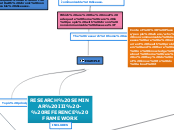Topic principal
RESEARCH SEMINAR III - REFERENCE FRAMEWORK
INCLUDES
Context, Concepts, Problem Approach, Objectives and Justification.
people with chronic non-communicable disease.
chronic noncommunicable disease (NCDs)
developing countries
NCDs caused 71% of deaths in all ages and both sexes in 2014
The direct and indirect costs of chronic noncommunicable diseases are high and it is necessary to know the risk factors that can worsen their condition and prevent them (1)
1. Gallardo-Solarte K. K, Benavides-Acosta F.P. F, Rosales-Jiménez R. R. Costos de la enfermedad crónica no transmisible: la realidad colombiana. Ciencias de la Salud. 2016;14(1):103-114.
Subtema
better guidelines for home care for people with chronic noncommunicable diseases can generate a better quality of life and prevent the presence of co-morbidities
What conditions are different in this population?
Which are the most common chronic noncommunicable diseases?
What complications does this population have?
Esp. objective--> understand what are the associated problems whitin each chronic non communicable disease
Esp. objective--> understand which are the noncommunicable chronic diseases that most often affect the population
Esp.objective--> establish the differences between a developed country and a developing country and how this affects their health and define the associated risk factors
Concepts
*what is a chronic non- comunicable disease?
*What is home care?
*What is a developing country?
*How home care could improve?
General objective= Establish adequate care for people with chronic non-communicable diseases.
GENERAL OBJECTIVE
Responds to the question posed in the problem
Contains all variables being studied
Thereby
Establish or set, What is going to be done to solve the research question
VERBS IN INFINITIVE
Demonstrate, Describe, Evaluate, Examine among others. (3)
3. Balestrini M. Cómo se elabora el proyecto de investigación. Caracas: Consultores Asociados; 2006.
Set time and place limit for its realization
Evaluate grade of satisfaction in students of UNIVERSIDAD OF LA SABANA in 2018-2 PERIOD
Must be quantifible, objective or realistic and measurable
EXAMPLE
¨Measure the amount of ghosts in a haunted house¨
¨Evaluate flexibility in young adults at the University of La Sabana¨
CONTEXT
According to the Royal Academy of the Spanish Language
¨Linguistic environment on which the meaning of a particular word, phrase or fragment depends.¨ (2)
2. Real academy of the Spanish language. Internet [2017] ; consultado el 05 Ago 2018] disponible en: http://dle.rae.es/?id=AVBbFZW
It could be defined as
THE CURRENT SITUATION OF THE THEME TO INVESTIGATE
SPECIFIC OBJECTIVES
How to develop the general objective to reach it
SOME FEATURES
Show achievement indicators for each step
¨They answer questions like, what? And for what?¨
¨Must be contained in the general objective¨
CONCEPT
In simple words, they are thoughts expressed in words
Are necessary to carry out a study
QUANTITATIVE STUDY
Defined in the research problem
QUALITATIVE STUDY
Defined depending on the objective with the community and how they are understood
JUSTIFICATION
It is necessary to answer three questions
Usefulness
Explain the benefits of the project to society. Point out what the research is useful
Importance
Explain why you, as a professional, are conducting this study and what will be the
contribution to the discipline.
Novelty
Document what has been studied on the topic so far and why, what you propose,
which is still missing, is something new.
EXAMPLE
The research home care
Context = Places/people where/who noncommunicable diseases are a recurrent health problem and there is no knowledge about home care or they do not know to do about it
Which are the most adequate home care in people with chronic noncommunicable diseases?
Topic flotante
PROBLEM
Research problem
Steps
Set the limits
Specify what you could study
State your proposal identifying knowledge
gaps
Stablish a problem question
It has to be resolved
